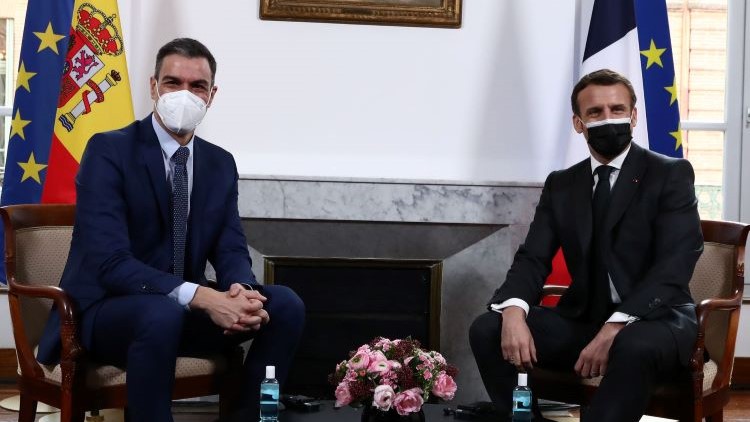Eduardo González
The President of the Government, Pedro Sánchez, yesterday took advantage of his participation in the Davos Forum 2023 to lash out against the “rotten seeds” sown by the Russian President, Vladimir Putin, in the EU Member States and against the “extreme right-wing forces” that are reaching the institutions thanks to the “support of the traditional conservative parties”, although he refrained from mentioning any specific examples.
Pedro Sánchez’s day at the World Economic Forum, which is being held in the Swiss town of Davos throughout this week, began with his intervention in the Country Strategy Dialogue, a space for dialogue behind closed doors between leaders and executives of large companies and in which the President of the Government addressed different aspects of the Spanish economy, such as the macroeconomic outlook, the reforms implemented by the Government to favor growth, sustainability and the green agenda or the state of execution of the investments committed to in the Recovery, Transformation and Resilience Plan.
Regarding the macroeconomic outlook, Pedro Sánchez recalled the five packages of measures approved by the Government throughout 2022 to alleviate the impact of the war in Ukraine on households, SMEs and assured that growth in 2022 exceeded 5%, and that, last December, the inflation rate in Spain (5.5%) was the lowest in the whole EU. He also stated that the forecasts of the main international organizations agree that Spain’s growth should exceed the average rates of the advanced economies in 2023.
Regarding the ecological transition, Sánchez explained that Spain is the fifth country in the world in wind energy and the eighth in the generation of renewable energy and aspires to become a leader in the generation of green hydrogen. The head of the Executive also addressed the deployment of the Recovery, Transformation and Resilience Plan and assured that Spain was, in 2021, the first country to receive the approval of its Plan, which amounted to 70,000 million euros, and is currently the most advanced country in the implementation and execution of European funds. The President of the Government also assured that Spain attracted, in 2022, foreign investment projects worth 30,000 million euros, an all-time record, and that the world’s largest multinationals are already investing in areas as varied as gigafactories, data centers, hydrogen or cybersecurity.
In response to various questions raised by the leaders of large companies regarding digitalization, the President of the Government assured that, during the Spanish Presidency of the European Council, Spain will promote policies that favor investment and encourage innovation.
Putin’s “rotten seeds” in Europe
The other major highlight of Pedro Sánchez’s presence in Davos was his address to the plenary (the so-called Key Note Address of the 53rd Annual Meeting of the World Economic Forum) together with the Forum’s President, Børge Brende.
During his speech, the chief executive warned against the rise of populism and against the “rotten seeds” sown by Russian President Vladimir Putin in EU member states. “Let us not forget that the Russian autocrat is not alone in these reactionary aspirations to turn back the clock,” he assured. He has many allies in Europe, who now hide their sympathies and connections with Putin, but just a year ago they were visiting him and praising his methods,” he declared.
“We must prevent these political forces from reaching the institutions and destroying the EU from within,” he continued. “Because the threat is very real, especially in those countries where these far-right forces have the support of the traditional conservative parties, which are opening the door to the governments for them,” denounced Sánchez, who avoided naming names, despite questions in this regard from the president of the Forum himself. “We will stand up to them with the same determination with which Ukrainians fight against Russian forces, although with different weapons: democracy, transparency and effective policies”, he added.
Albares
For his part, the Minister of Foreign Affairs, José Manuel Albares, kept his own personal agenda in Davos, which included his intervention in the panel In Defence of Europe, together with the Polish President, Andrzej Duda; the President of Lithuania, Gitanas Nausėda; the President of North Macedonia, Stevo Pendarovski; and the leader of the Democratic Forces of Belarus, Sviatlana Tsikhanouskaya. “Unity in the EU and with our partners and allies is the most effective way to defend the European project and to cope with crises,” Albares said during the meeting. He also held a meeting with Sviatlana Tsikhanouskaya herself, to whom he reiterated “Spain’s support for her tireless work for democracy and freedom in Belarus”.
José Manuel Albares also held his first meeting with the new Minister of Foreign Affairs of Israel, Eli Cohen. “We want to continue developing the excellent bilateral relations between Spain and Israel; and contribute to peace in the region based on the two-state solution,” Albares stated via Twitter. He later met with his counterpart from Switzerland – the host country of the meeting – Ignazio Cassis, to go over “excellent bilateral relations”, European affairs, the situation in Ukraine and “how to deal with the global consequences of the war”.







